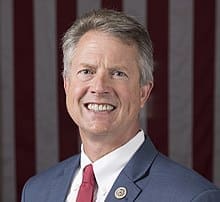In a press conference this afternoon U.S. Senator Roger Marshall, M.D., announced that the proposed Midwest Plains transmission line has been removed from the U.S. Department of Energy’s (DOE) National Interest Electric Transmission Corridor (NIETC) project. Following months of advocacy, including roundtables and meetings with every affected county, Sen. Marshall brought Kansans’ concerns directly to the DOE. His efforts have effectively halted the controversial proposal.
“Today the announcement was made by the Department of Energy that they are not going to do the
five-mile wide power transmission line across the state of Kansas. We have successfully
stopped that and I’m proud to have been at the point of the spear of that since day one
fighting it,” said Sen. Marshall. “Kansans have spoken and will proudly plant that flag as a big victory for Kansans.”
The U.S. Department of Energy announced it had reduced the proposed transmission line corridors from 10 to three. Among those removed was the Midwest-Plains Corridor, which would have stretched from southwest Kansas to Illinois. This decision resulted from Sen. Marshall’s efforts and the advocacy of Kansans who voiced their concerns to the DOE.
Sen. Marshall also addressed postal issues. He shared that the Winchester Post Office will reopen after being closed since 2020, thanks to direct intervention. Other postal improvements include relocating Olathe’s main post office and addressing systemic delivery delays tied to a processing center in Kansas City. However, he criticizes the U.S. Postal Service as fundamentally broken, losing billions annually, and suggests privatization as a potential solution.
Finally, Sen. Marshall noted progress on reducing water costs through legislative changes affecting reservoir loans, saving millions for Kansans. Regarding the farm bill, he emphasized the importance of crop insurance, fair reference prices, and effective conservation programs, while opposing current Democratic proposals. He also stated that a government shutdown over farm bill disagreements seems unlikely.













